Geolocation is one of the important features of HTML5. It provides the function of determining the user's location. With this feature, applications based on location information can be developed. Today’s article will introduce to you the basic principles of HTML5 geolocation and the data accuracy of each browser.
How to use the HTML5 geolocation function
The positioning function (Geolocation) is a new feature of HTML5, so it can only run on modern browsers that support HTML5, especially handheld devices such as iPhone, geolocation is more precise. First we need to detect whether the user's device browser supports geolocation, and if so, obtain the geographic information. Note that this feature may infringe on the user's privacy. Unless the user agrees, the user's location information is not available, so when we access the application, we will be prompted whether to allow geolocation. Of course, we can choose to allow it.
function getLocation(){
if (navigator.geolocation){
navigator.geolocation.getCurrentPosition(showPosition,showError);
}else{
alert("浏览器不支持地理定位。");
}
}The above code can know that if the user device supports geolocation, the getCurrentPosition() method is run.
Before accessing location information, the browser will ask the user whether to share their location information. Taking the Chrome browser as an example, if you allow the Chrome browser to share your location with the website, the Chrome browser will ask Google Location The service sends local network information to estimate your location. The browser then shares your location with websites that request your location.
HTML5 Geolocation API is very simple to use. The basic calling method is as follows:
if (navigator.geolocation) {
navigator.geolocation.getCurrentPosition(locationSuccess, locationError,{
// 指示浏览器获取高精度的位置,默认为false
enableHighAccuracy: true,
// 指定获取地理位置的超时时间,默认不限时,单位为毫秒
timeout: 5000,
// 最长有效期,在重复获取地理位置时,此参数指定多久再次获取位置。
maximumAge: 3000
});
}else{
alert("Your browser does not support Geolocation!");
}LocationError is the callback function that fails to obtain location information. You can prompt information according to the error type:
locationError: function(error){
switch(error.code) {
case error.TIMEOUT:
showError("A timeout occured! Please try again!");
break;
case error.POSITION_UNAVAILABLE:
showError('We can\'t detect your location. Sorry!');
break;
case error.PERMISSION_DENIED:
showError('Please allow geolocation access for this to work.');
break;
case error.UNKNOWN_ERROR:
showError('An unknown error occured!');
break;
}
}LocationSuccess is a callback function that successfully obtains location information. The returned data contains information such as longitude and latitude. Combined with the Google Map API, the current user's location information can be displayed on the map, as follows:
locationSuccess: function(position){
var coords = position.coords;
var latlng = new google.maps.LatLng(
// 维度
coords.latitude,
// 精度
coords.longitude
);
var myOptions = {
// 地图放大倍数
zoom: 12,
// 地图中心设为指定坐标点
center: latlng,
// 地图类型
mapTypeId: google.maps.MapTypeId.ROADMAP
};
// 创建地图并输出到页面
var myMap = new google.maps.Map(
document.getElementById("map"),myOptions
);
// 创建标记
var marker = new google.maps.Marker({
// 标注指定的经纬度坐标点
position: latlng,
// 指定用于标注的地图
map: myMap
});
//创建标注窗口
var infowindow = new google.maps.InfoWindow({
content:"您在这里<br/>纬度:"+
coords.latitude+
"<br/>经度:"+coords.longitude
});
//打开标注窗口
infowindow.open(myMap,marker);
}Passed After testing, the location information obtained by the four browsers Chrome/Firefox/Safari/Opera is exactly the same. It is estimated that they all use the same location service. The data is as follows:

The data obtained by IE browser is different from the data obtained by the above browsers. The data is as follows:

Location services Local network information used to estimate your location includes: information about visible WiFi access points (including signal strength), information about your local router, and your computer's IP address. Location services accuracy and coverage vary by location.
Generally speaking, the location accuracy obtained by the geographical location function of HTML5 in PC browsers is not high enough. If you use this HTML5 feature to make a cityweather forecast, it is more than enough. , but if it is a map application, the error is still too large. However, if it is an HTML5 application on a mobile device, you can set the enableHighAcuracy parameter to true and call the device's GPS positioning to obtain high-precision geographical location information.
The above is the detailed content of How to use HTML5 geo-targeting feature?. For more information, please follow other related articles on the PHP Chinese website!
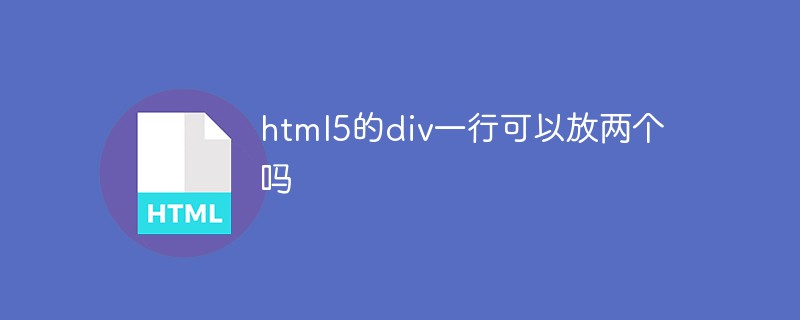 html5的div一行可以放两个吗Apr 25, 2022 pm 05:32 PM
html5的div一行可以放两个吗Apr 25, 2022 pm 05:32 PMhtml5的div元素默认一行不可以放两个。div是一个块级元素,一个元素会独占一行,两个div默认无法在同一行显示;但可以通过给div元素添加“display:inline;”样式,将其转为行内元素,就可以实现多个div在同一行显示了。
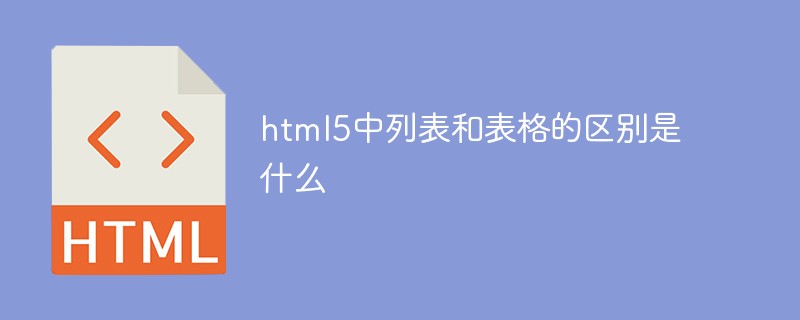 html5中列表和表格的区别是什么Apr 28, 2022 pm 01:58 PM
html5中列表和表格的区别是什么Apr 28, 2022 pm 01:58 PMhtml5中列表和表格的区别:1、表格主要是用于显示数据的,而列表主要是用于给数据进行布局;2、表格是使用table标签配合tr、td、th等标签进行定义的,列表是利用li标签配合ol、ul等标签进行定义的。
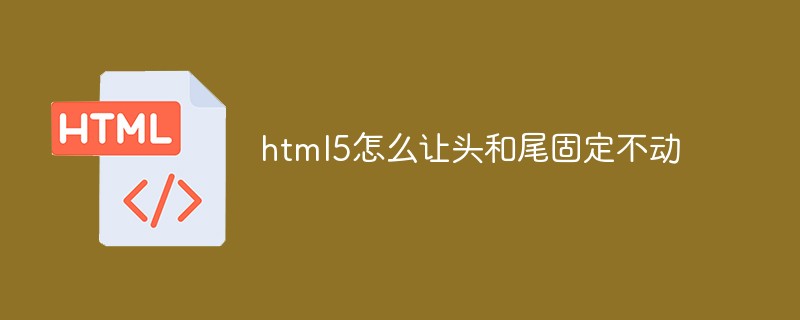 html5怎么让头和尾固定不动Apr 25, 2022 pm 02:30 PM
html5怎么让头和尾固定不动Apr 25, 2022 pm 02:30 PM固定方法:1、使用header标签定义文档头部内容,并添加“position:fixed;top:0;”样式让其固定不动;2、使用footer标签定义尾部内容,并添加“position: fixed;bottom: 0;”样式让其固定不动。
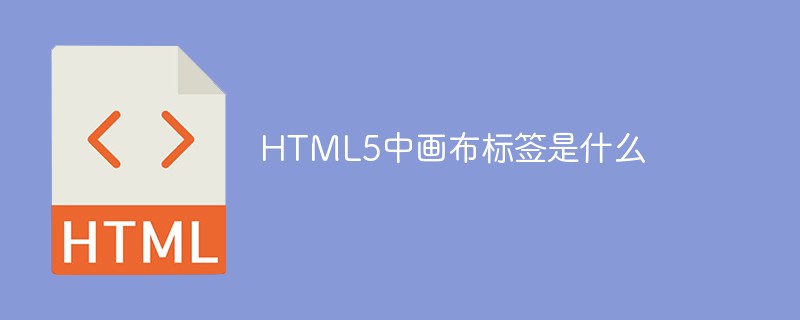 HTML5中画布标签是什么May 18, 2022 pm 04:55 PM
HTML5中画布标签是什么May 18, 2022 pm 04:55 PMHTML5中画布标签是“<canvas>”。canvas标签用于图形的绘制,它只是一个矩形的图形容器,绘制图形必须通过脚本(通常是JavaScript)来完成;开发者可利用多种js方法来在canvas中绘制路径、盒、圆、字符以及添加图像等。
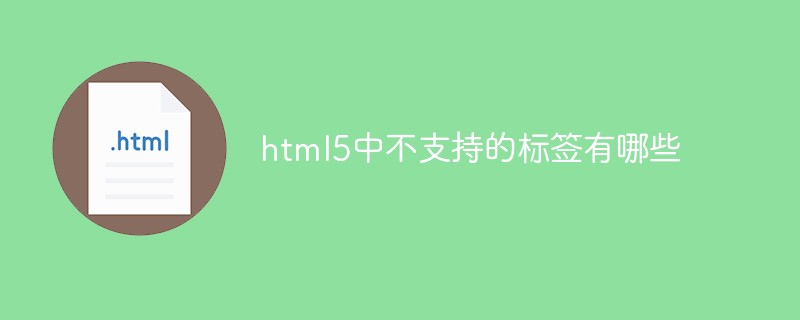 html5中不支持的标签有哪些Mar 17, 2022 pm 05:43 PM
html5中不支持的标签有哪些Mar 17, 2022 pm 05:43 PMhtml5中不支持的标签有:1、acronym,用于定义首字母缩写,可用abbr替代;2、basefont,可利用css样式替代;3、applet,可用object替代;4、dir,定义目录列表,可用ul替代;5、big,定义大号文本等等。
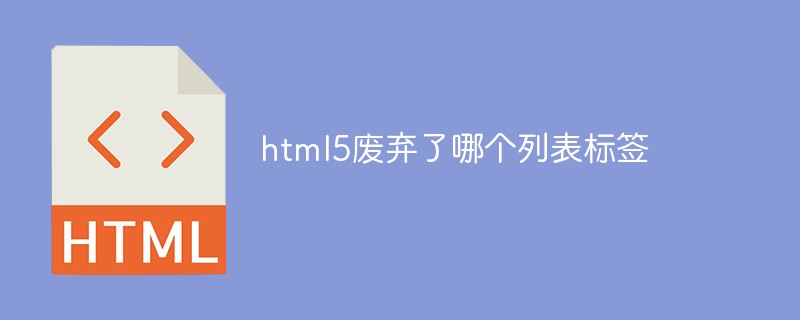 html5废弃了哪个列表标签Jun 01, 2022 pm 06:32 PM
html5废弃了哪个列表标签Jun 01, 2022 pm 06:32 PMhtml5废弃了dir列表标签。dir标签被用来定义目录列表,一般和li标签配合使用,在dir标签对中通过li标签来设置列表项,语法“<dir><li>列表项值</li>...</dir>”。HTML5已经不支持dir,可使用ul标签取代。
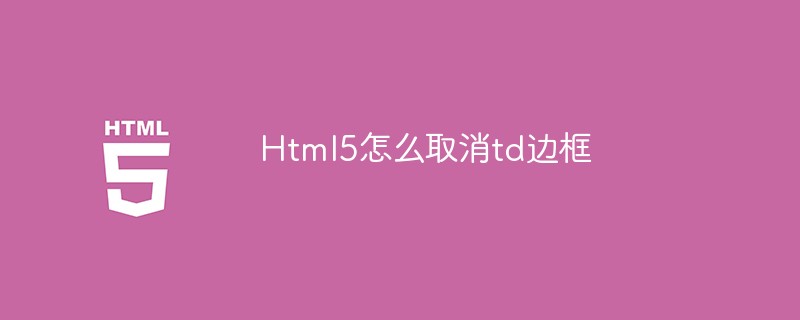 Html5怎么取消td边框May 18, 2022 pm 06:57 PM
Html5怎么取消td边框May 18, 2022 pm 06:57 PM3种取消方法:1、给td元素添加“border:none”无边框样式即可,语法“td{border:none}”。2、给td元素添加“border:0”样式,语法“td{border:0;}”,将td边框的宽度设置为0即可。3、给td元素添加“border:transparent”样式,语法“td{border:transparent;}”,将td边框的颜色设置为透明即可。
 html5为什么只需要写doctypeJun 07, 2022 pm 05:15 PM
html5为什么只需要写doctypeJun 07, 2022 pm 05:15 PM因为html5不基于SGML(标准通用置标语言),不需要对DTD进行引用,但是需要doctype来规范浏览器的行为,也即按照正常的方式来运行,因此html5只需要写doctype即可。“!DOCTYPE”是一种标准通用标记语言的文档类型声明,用于告诉浏览器编写页面所用的标记的版本。


Hot AI Tools

Undresser.AI Undress
AI-powered app for creating realistic nude photos

AI Clothes Remover
Online AI tool for removing clothes from photos.

Undress AI Tool
Undress images for free

Clothoff.io
AI clothes remover

AI Hentai Generator
Generate AI Hentai for free.

Hot Article

Hot Tools

SublimeText3 Chinese version
Chinese version, very easy to use

WebStorm Mac version
Useful JavaScript development tools

Zend Studio 13.0.1
Powerful PHP integrated development environment

SublimeText3 Linux new version
SublimeText3 Linux latest version

Safe Exam Browser
Safe Exam Browser is a secure browser environment for taking online exams securely. This software turns any computer into a secure workstation. It controls access to any utility and prevents students from using unauthorized resources.






